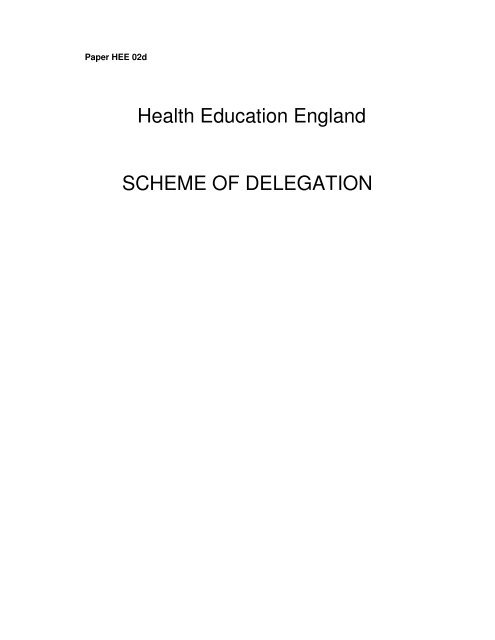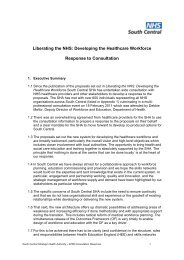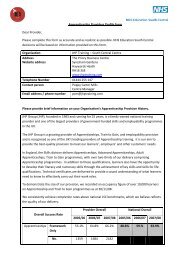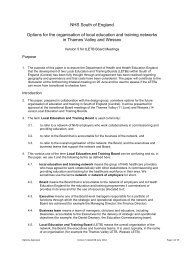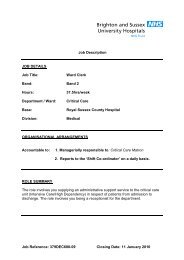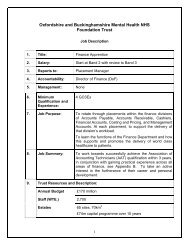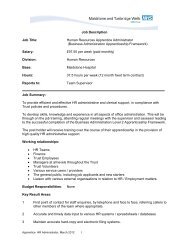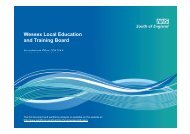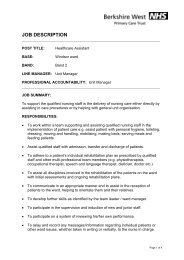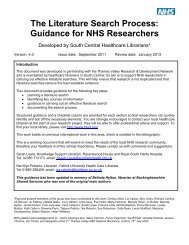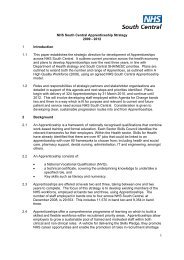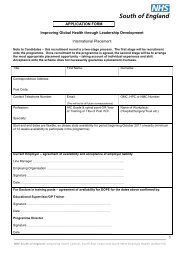Health Education England SCHEME OF DELEGATION
Health Education England SCHEME OF DELEGATION
Health Education England SCHEME OF DELEGATION
You also want an ePaper? Increase the reach of your titles
YUMPU automatically turns print PDFs into web optimized ePapers that Google loves.
Paper HEE 02d<strong>Health</strong> <strong>Education</strong> <strong>England</strong><strong>SCHEME</strong> <strong>OF</strong> <strong>DELEGATION</strong>
This document provides reference to areas of delegated responsibility as defined inBoard’s Standing Orders and Standing FinancialInstructions.The following abbreviations are used throughout:Chief Executive (CE)Director of Finance (DF)Corporate Secretary (CS)Head of Internal Audit (HIA)Audit Committee (AC)<strong>SCHEME</strong> <strong>OF</strong> <strong>DELEGATION</strong> IMPLIED BY WAYS <strong>OF</strong> WORKING(STANDING ORDERS)SO ref Delegated to Powers delegated3.1 Chair Urgent decisions on behalf of Authority (subject to report atnext meeting).3.3 Corporate Maintain a register of members’ interests in any matterSecretary relating to the Authority.3.4.2 Chair Determine the nature of a formal vote.3.4.5 Chair Cast a second and deciding vote in the case of an equalvote.4 Chair The decision of the Chair on order, relevancy and regularityand interpretation of Ways of Working (Standing Orders)shall be final as advised by the CE and CS.5.1.1 Corporate Responsible for formally recording meetingsSecretary5.1.2 Chair Responsible for summarising action points and decisionsduring the meeting.5.1.3 CE Review draft Board minutes5.1.4 Chair Approve Board minutes5.1.6 Chair Sign the minutes at the following meeting creating an officialrecord of the meeting<strong>SCHEME</strong> <strong>OF</strong> <strong>DELEGATION</strong> IMPLIED BY STANDINGFINANCIAL INSTRUCTIONSSFI ref Delegated to Powers delegated1.2.2.1 CE Overall executive responsibility for Authority’s activities andmeeting resource and cash limits1.2.2.2 DF CE to delegate detailed responsibility for financial activitiesand controls to DF1.2.2.3 CE and DF Responsible for the implementation of the Authority’sfinancial policies and for co-ordinating any corrective actionnecessary to further these policies1.2.2.4 CE Staff to be notified of SFI responsibilities1.2.3.1 DF Approve all financial procedures1.2.3.2 DF Provision of financial advice to members and staff1.2.3.2 DF Design, implementation and supervision of systems ofinternal financial control2
1.2.3.2 DF Maintenance of proper accounting records1.2.3.4 DF Ensure cash is drawn for approved expenditure only andonly at the time of need1.2.4.1 Board, Responsible for the security of the Authority’s property;members avoiding loss; exercising economy and efficiency in the useand of resources; conforming with SOs, SFIs, Scheme ofemployees Delegation and Financial Procedures1.2.4.1 Any officer Report any irregularities or impropriety relating to theseregulations to the Director of Finance1.2.4.1 DF Consider any such suspicions to determine if the caseshould be referred to the Local Counter Fraud Specialist1.2.5.1 Directors Directors responsible for arranging contracts shall ensurethat those contracts are correctly monitored and governed1.2.5.2 CE Ensure that contractors who are empowered by the Authorityto commit the Authority to expenditure are aware that theyare covered by the SFIs1.2.6.1 AC Provide an independent and objective view of internal control1.2.6.2 AC Chair Report evidence of ultra vires transactions, evidence ofimproper acts or other important matters to the DF and CE.If the matter is not resolved the matter will be raised at a fullmeeting of the Board2.1 DF Prepare and submit financial plans in accordance with DHrequirements2.2 DF Ensure that financial details contained within serviceagreements of contracts are consistent with the requirementto balance income and expenditure2.3 CE Compile and submit annual business plan to Authority2.4-2.11 DF Compile financial estimates, forecasts and monitor spendingand report on exceptions2.12-2.15 CE Establish delegated budgeting control framework2.16 DF Inform CE of financial consequence of change in policy, payawards and other events affecting budgets and advise on thefinancial and economic aspects of future plans and projects2.17 CE Ensure appropriate financial monitoring forms are submitted3 DF Preparation of annual accounts4.1-4.7 CE and DF Overall banking arrangements5.1.1 CE Ensure adequate appraisal process in place for determiningcapital expenditure priorities5.1.2 CE Ensure that a business case is produced in line withguidance5.1.2 DF Certify the costs and revenue consequences of businessescases5.1.5 DF Issue procedures for the regular reporting of expenditure andcommitment against authorised expenditure5.1.6 CE Authorise an officer of the Authority to commit expenditure,proceed to a competitive offer and approval to accept asuccessful competitive offer5.1.7 DF Issue procedures governing financial management5.2.1 CE and DF Maintain Asset Register and Register of Inventory Items5.2.2 DF Determine necessary action in the case of persistent breachof agreed security practices5.2.3 CE Define the items of equipment to be recorded on either theCapital Asset Register or Inventory Register5.2.6 DF Approve procedures for reconciling balances on fixed asset3
accounts against fixed asset registers5.2.9 DF Calculate and account for capital charges5.2.12 DF Maintain register of properties owned or leased by Authority5.3.1 DF Approve asset control procedures6 DF Cash and cheque security arrangements7.1.1 CE Approve changes to funded establishment where necessary7.3 DF Arrangements for payment of staff7.4.1 CE Ensure all employees are issued with a contract ofemployment8 DF Payment of accounts arrangements10 DF Contracting and purchasing arrangements10.6 CE Approve orders for which there is not budget provision10.7 CE Ensure arrangements are in place to maintain a register ofGifts and Hospitality11.1 CE Ensure Authority is registered for compliance with DataProtection Act and that a Freedom of Information PublicationScheme is published and maintained12.2 DF Ensure the accuracy and security of computerised financialdata is in accordance with security retention and DataProtection policies12.3 CE Appoint an officer to devise and implement necessaryprocedures to ensure protection of Authority’s IT system12.4 CE Appoint an officer to ensure adequate controls exist overdata entry, processing, storage, transmission and output toensure security, privacy, accuracy, completeness, andtimeliness of all Authority finance systems12.5 DF Ensure that contracts relating to the computerised financialsystem clearly define responsibilities12.6 DF Ensure adequate assurance is received where otheragencies provide a computer service for financialapplications regarding relevant controls12.7 DF Ensure adequate controls exist for the transmission offinancial data across networks13.1 CE Ensure Internal Audit arrangements are in place13.2-13.8 HIA Responsible for internal audit function13.10 DF Investigate irregularities13.11 DF Immediately report any such irregularities to the CE14 DF Losses and special payments arrangements15.1 CE and DF Monitor and ensure compliance with NHSCFSMSarrangements17.1 CE Ensure the Authority has a programme of risk managementin place17.4 DF Ensure insurance arrangements exist in accordance with therisk management programme18.1 CE Maintain archives for all documents required to be retainedunder DH guidelines18.2 DF Authorise individuals to retrieve archived documents
SCHEDULE <strong>OF</strong> MATTERS RESERVEDTO THE BOARD1. ROLE <strong>OF</strong> THE CHIEF EXECUTIVE• All powers of the Authority that have not been retained as reserved forthe Board or otherwise delegated to a committee, sub-committee orother body, shall be exercised on behalf of the Board by the ChiefExecutive unless otherwise specified in the Standing FinancialInstructions or Scheme of Delegation. The Board may at any timewithdraw, alter or vary such delegation either generally or in relation toany specific matter.• This reflects the responsibility of the Chief Executive as the AccountingOfficer for the Authority. The Chief Executive shall prepare and maintaina detailed Schedule of Delegation identifying the functions he/she shallperform personally and those delegated to directors. Such delegatedpowers can be undertaken by the Chief Executive when the need arises.• The identification of specified directors under this scheme of delegationdoes not, unless specifically stated, limit their discretion to allocate atask to subordinates, but the director concerned will always be heldaccountable for those tasks assigned as responsible officer, regardlessof any subsequent delegation.• In the absence of the Chief Executive, powers delegated to him/her maybe exercised by the Director of Finance or, in his/her absence, suchother director determined by the Chief Executive with the agreement ofthe Chairman. In the absence of directors their delegated powers willnormally revert to the Chief Executive unless an alternative nominatedofficer is agreed by the Chief Executive and the Chairman.• The Chief Executive has a responsibility to consult with the Boardregarding any decision, transaction or other matter which mightreasonably be expected to expose <strong>Health</strong> <strong>Education</strong> <strong>England</strong> tosignificant financial, reputational, business or other risk.2. MATTERS RESERVED TO THE BOARD3.4 REGULATION AND CONTROLTo approve Standing Orders, Standing Financial Instructions,Matters Reserved for the Board and the Scheme of Delegation forthe regulation of its proceedings and business, and anysubsequent variations thereto.To receive and review the Register of Interests declared bymembers of the Board, which may conflict with those of theAuthority and determining the extent to which that member mayremain involved with the matter under consideration.
2.1.3 To ratify any urgent decisions taken by the Chairman in accordance withStanding Order 3.1.2.1.4 To agree action on litigation against or on behalf of the Authority incircumstances which would have a significant impact on the commercialinterests or reputation of <strong>Health</strong> <strong>Education</strong> <strong>England</strong>2.2 APPOINTMENTS2.2.1 To appoint and dismiss chairs and members of committees of the Board,and approve the Terms of Reference for such committees.The Chair of the Audit Committee will be appointed by the Secretary ofState for <strong>Health</strong>.2.2.2 To agree the delegation by a Board committee of its powers to asubcommittee.2.2.3 Chairman and non-executive members only: To discipline and dismiss,as appropriate, the Chief Executive.2.2.4 Chairman, non-executive members and Chief Executive only: To appointand dismiss, as appropriate, executive members of the Board.2.3 BUSINESS PLANS AND BUDGETS2.3.1 To review and approve annually:a) The Authority’s Business Planb) The Authority’s Annual Revenue and Capital Budgets2.3.2 To approve any changes to the Authority’s strategic corporate objectivesfollowing agreement of the Business Plan.2.3.3 To approve the Authority’s policies and procedures (as reviewed by theAudit Committee) for the management of risk.2.4 FINANCIAL AND PERFORMANCE MONITORING2.4.1 To appraise the overall business performance of the Authority byreceiving a report from the Chief Executive at each meeting of theBoard.2.4.2 To approve on an annual basis the Authority’s use of the Resource Limitfor the year.
2.4.3 To appraise the financial position of the Authority, by receiving a reportat each meeting from the Director of Finance.2.4.4 To appraise other aspects of performance monitoring by receivingperiodic reports linked to progress in achieving the Authority’s objectivesas set out in the strategy and annual corporate business plan.2.4.5 To receive other reports, as it sees fit, from members, committees andofficers of the Authority.2.5 AUDIT ARRANGEMENTS2.5.1 To approve audit arrangements, including the appointment and, ifnecessary, dismissal of the Authority’s internal auditors. In the firstinstance, this will be provided by the Department of <strong>Health</strong> Internal Auditfunction, pending longer term arrangements being put in place.2.5.2 To receive reports of the Audit Committee meetings and approverecommendation on investigations carried out into breaches of StandingOrders or Standing Financial Instructions.2.5.3 To receive the Annual Audit Letter received from the external auditorand agree appropriate action on the recommendation of the AuditCommittee.2.5.4 To receive an annual report from the Internal Auditor and agree actionon recommendations, where appropriate, of the AuditCommittee.2.6 APPROVAL <strong>OF</strong> ANNUAL REPORTS AND ACCOUNTS2.6.1 To approve and adopt the Authority’s Annual Report.2.6.2 To receive and adopt the full and complete set of AnnualStatements of Account.2.6.3 To receive and adopt the Annual Report of the Audit Committee.2.6.4 To call an Annual Public Meeting at which the Authority’s Annual Reportand Annual Accounts will be presented.
<strong>SCHEME</strong> <strong>OF</strong> <strong>DELEGATION</strong> DERIVED FROM THE ACCOUNTABLE <strong>OF</strong>FICER MEMORANDUMREF DELEGATED TO DUTIES DELEGATED7 CE Accountable through NHS Accounting Officer to Parliament forstewardship of Authority resources.9 CE ANDDIRECTOR <strong>OF</strong>FINANCE (D<strong>OF</strong>)Ensure the accounts of the Authority are prepared under principlesand in a format directed by SofS. Accounts must disclose atrue and fair view of the Authority’s income and expenditure and itsstate of affairs.Sign the accounts on behalf of the Board.10 CE Ensure a signed statement is included with the accounts outlining theChief Executive’s responsibilities as the AccountableOfficer.Sign a statement in the accounts outlining responsibilities in respect ofInternal Control12 & 13 CE Ensure effective management systems that safeguard public fundsand assist Authority Chairman to implement requirements ofcorporate governance including ensuring managers:• have a clear view of their objectives and the means to assessachievements in relation to those objectives;• be assigned well defined responsibilities for making best use ofresources;• have the information, training and access to the expert advice theyneed to exercise their responsibilities effectively.12 Chair Implement requirements of corporate governance13 CE Achieve value for money from the resources available to the Authorityand avoid waste and extravagance in the organisation'sactivities.Follow through the implementation of any recommendations affectinggood practice as set out on reports from such bodies asthe Audit Commission and the National Audit Office (NAO).15 DF Operational responsibility for effective and sound financialmanagement and information15 CE Primary duty to see that DoF discharges this function.16 CE Ensuring that expenditure by the Authority complies withParliamentary requirements.17 CE The Codes of Conduct and Accountability incorporated in theCorporate Governance Framework issued to NHS Boards by theSecretary of State are fundamental in exercising your responsibilitiesfor regularity and probity. As a Board member you haveexplicitly subscribed to the Codes; you should promote theirobservance by all staff.18 CE ANDDIRECTOR <strong>OF</strong>FINANCE (D<strong>OF</strong>)Chief Executive, supported by Director of Finance, to ensureappropriate advice is given to the Board on all matters of probity,regularity, prudent and economical administration, efficiency andeffectiveness19 CE If CE considers the Board or Chairman is doing something whichmight infringe probity or regularity, he/she should set this outin writing to the Chairman and the Board. If the matter is unresolved,he/she should ask the Audit Committee to inquire and ifnecessary the Authority and Department of <strong>Health</strong>.21 CE If the Board is contemplating a course of action which raises an issue
not of formal propriety or regularity but affects the CE’sresponsibility for value for money, the CE should draw the relevantfactors to the attention of the Board. If the outcome is thatyou are overruled it is normally sufficient to ensure that your adviceand the overruling of it are clearly apparent from the papers.Exceptionally, the CE should inform the Authority and the DH. In suchcases, and in those described inparagraph 24, the CE should as a member of the Board vote againstthe course of action rather than merely abstain fromvoting.
<strong>SCHEME</strong> <strong>OF</strong> <strong>DELEGATION</strong> DERIVED FROM THE CODES <strong>OF</strong> CONDUCT ANDACCOUNTABILITYREF Delegated to AUTHORITIES/DUTIES DELEGATED1.3.1.7 Board Approve procedure for declaration of hospitality and sponsorship.1.3.1.8 Board Ensure proper and widely publicised procedures for voicing complaints,concerns about maladministration, breaches of Code ofConduct, and other ethical concerns1.31.9&1.3.2.2Board Subscribe to Code of Conduct.1.3.2.4 Board Board members share corporate responsibility for all decisions of the Board1.3.2.4 Chair And Chair and non-officer members are responsible for monitoring the executiveNon management of the organisation and are responsible to–Executive the SofS for the discharge of those responsibilities.Members1.3.2.4 Board The Board has six key functions for which it is held accountable by theDepartment of <strong>Health</strong> on behalf of the Secretary of State:1. to ensure effective financial stewardship through value for money,financial control and financial planning and strategy;2. to ensure that high standards of corporate governance and personalbehaviour are maintained in the conduct of the business of thewhole organisation;3. to appoint, appraise and remunerate senior executives;4. on the recommendation of the Chief Executive [and Senior ManagementTeam], to ratify the strategic direction of the organisationwithin the overall policies and priorities of the Government and the NHS,define its annual and longer term objectives and agree plansto achieve them;5. to oversee the delivery of planned results by monitoring performanceagainst objectives and ensuring corrective action is takenwhen necessary;6. to ensure an effective dialogue with the stakeholders on their plans andperformance and that these are responsive to thecommunity's needs.1.3.2.4 Board It is the Board’s duty to:1. act within statutory financial and other constraints;2. be clear what decisions and information are appropriate to the Board anddraw up Standing Orders, a Schedule of Decisions Reserved to the Boardand Standing Financial Instructions to reflect these;3. ensure that management arrangements are in place to enableresponsibility to be clearly delegated to senior executives for themain programmes of action and for performance against programmes to bemonitored and senior executives held to account;4. establish performance and quality measures that maintain the effectiveuse of resources and provide value for money;5. specify its requirements in organising and presenting financial and otherinformation succinctly and efficiently to ensure the boardcan fully undertake its responsibilities;6. establish Audit and Remuneration Committees on the basis of formallyagreed terms of reference which set out the membership ofthe sub-committee, the limit to their powers, and the arrangements forreporting back to the main Board.1.3.2.5 Chair It is the Chairman's role to:1. provide leadership to the Board;
2. enable all Board members to make a full contribution to the Board's affairsand ensure that the Board acts as a team;3. ensure that key and appropriate issues are discussed by the Board in atimely manner;4. ensure the Board has adequate support and is provided efficiently with allthe necessary data on which to base informed decisions;5. lead non-executive Board members through a formally-appointedRemuneration Committee of the main Board on the appointment,appraisal and remuneration of the Chief Executive and (with the latter) otherexecutive Board members;6. appoint non-executive Board members to an Audit Committee of the mainBoard;7. advise the Secretary of State on the performance of non-executive Boardmembers1.3.2.5 CE The Chief Executive is accountable to the Chairman and non-executivemembers of the Board for ensuring that its decisions areimplemented, that the organisation works effectively, in accordance withGovernment policy and public service values and for themaintenance of proper financial stewardship.The Chief Executive should be allowed full scope, within clearly defineddelegated powers, for action in fulfilling the decisions of theBoard. The other duties of the Chief Executive as Accountable Officer arelaid out in the Accountable Officer Memorandum.1.3.2.6 NonExecutiveDirectors1.3.2.8 Board andseniormanagementteamNon-Executive Directors are appointed by the Secretary of State to bringindependent judgement to bear on issues of strategy,performance, key appointments and accountability through the Departmentof <strong>Health</strong> to Ministers and to the local communityDeclaration of conflict of interests.1.3.2.9 Board NHS Boards must comply with legislation and guidance issued by theDepartment of <strong>Health</strong> on behalf of the Secretary of State,respect agreements entered into by themselves or in on their behalf andestablish terms and conditions of service that are fair to thestaff and represent good value for taxpayers' money.
<strong>SCHEME</strong> <strong>OF</strong> FINANCIAL <strong>DELEGATION</strong> FOR REQUISITIONS AND PAYMENTS IN RESPECT <strong>OF</strong>GOODS AND SERVICES (Administration costs)Financial LimitOver £100,000Up to £100,000Up to £50,000Up to £25,000Up to £10,000Up to £1000HEE and LETBBoardChief Executive, Managing DirectorDirector or Finance, LETB Director of FinanceExecutive Directors, LETB DirectorsHeads of DepartmentBudget Holders and other authorised signatories<strong>SCHEME</strong> <strong>OF</strong> FINANCIAL <strong>DELEGATION</strong> FOR REQUISITIONS AND PAYMENTS IN RESPECT <strong>OF</strong>EDUCATION CONTRACTSApproval of contractualexpenditureHEELETBContractual payments in respect ofeducation contracts with <strong>Education</strong>InstitutionsHead of FinanceBudget HoldersAuthorised signatoriesHead of FinanceBudget HoldersAuthorised signatoriesContractual payments in respect ofeducation contracts with NHSbodiesHead of FinanceBudget HoldersAuthorised signatoriesHead of FinanceBudget HoldersAuthorised signatoriesVariations to contractualexpenditureor non-contractual payments re.education contracts – authorizedlimitsUp to £250,000 Relevant Head of Department Relevant Head ofDepartment£250,000 to £500,000 Relevant Executive Director Relevant LETB Director£500,000 to £1m Chief ExecutiveDirector of FinanceManaging DirectorLETB Director of Finance£1m to £5m Chief Executive Managing DirectorOver £5m Board LETBAUTHORISATION <strong>OF</strong> VIREMENTAmount of delegated virement HEE LETB£0 - £19,999 Executive Directors LETB Directors£20,000 - £249,999 Director of Finance LETB Director of Finance£250,000 - £499,999 Chief Executive Managing DirectorAbove £500,000 Board LETB


